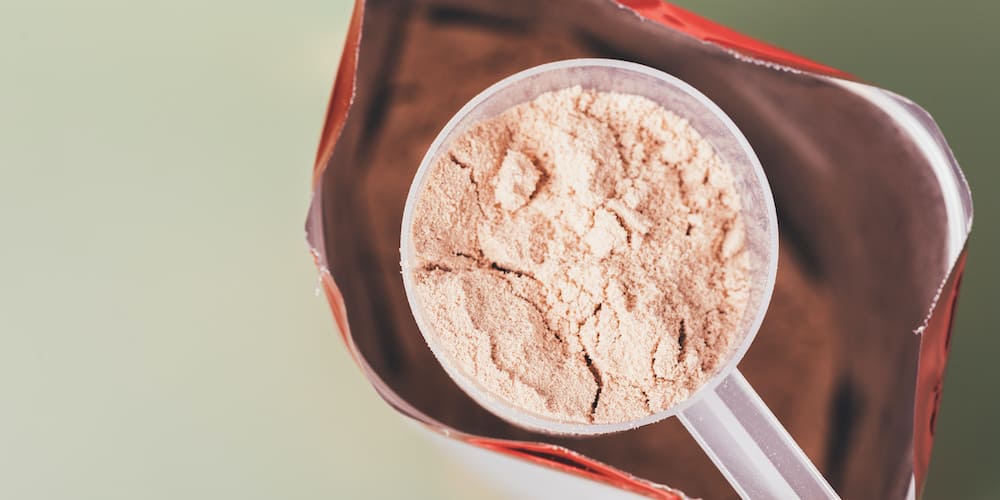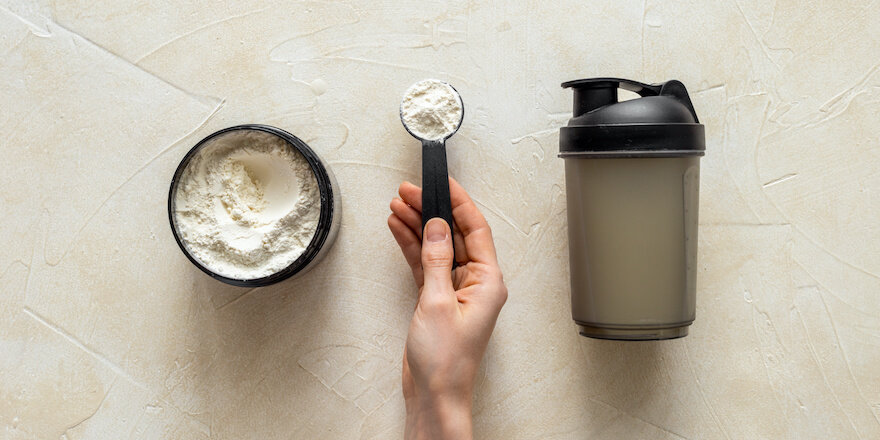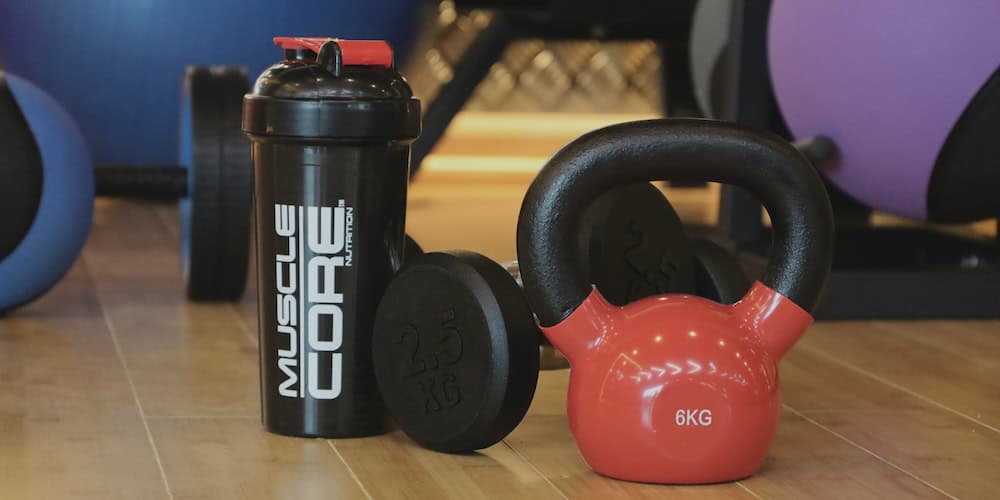The protein shake, long reserved for weightlifters, offers many advantages: it is easy to prepare, easy to transport, and nutrient-dense.
To succeed in gaining mass, you can also customize the composition of your shake according to your tastes and needs.
With water or milk, plant-based or animal proteins, in powder form or nourishing foods… Several options are available to you!
Here I explain how to prepare your mass-gainer shake optimally, with recipe ideas and tips.
📚 Read also | The 4 best whey isolates for gaining mass, according to a dietitian
My mass-gainer shake recipes
Ingredients to enrich your shake
Follow the instructions for use provided. Generally, you have 1 measuring scoop to measure the correct amount to pour into the shaker.
You can mix the chosen protein with water or plant-based milk; adjust the amount according to the desired flavor and texture. Count on an average of 150 calories per shake (excluding mass gainer).
To make an effective mass-gaining shake, you can add foods to it depending on training intensity and appetite.
Preferably combine ingredients rich in low-GI carbohydrates, healthy fats, and other proteins; I recommend:
- some carbohydrates with fruits such as banana, oats, or cocoa powder
- some healthy fats: hazelnut purée, peanut butter, chia seeds, flax seeds, or avocado
- some creamy proteins: plain yogurt, fromage blanc or skyr, or silken tofu
Whey isolate shake, banana-split style
- 1 scoop of whey isolate protein (vanilla or unflavored)
- 200 ml of plain almond milk
- 1 banana
- 1 tablespoon of peanut butter
- 1 tablespoon of slivered almonds
Blend the whey with almond milk, the peeled and chopped banana, and the peanut butter. Then add the almonds to garnish.
Nutritional value: 356 kcal
Protein: 32.5 g
Fat: 15.6 g
Carbohydrates: 28.4 g
High-protein vegan smoothie shake
- 1 scoop of hemp protein
- 200 ml of light coconut milk
- 100 g of mixed berries (strawberries, blueberries, raspberries)
Blend all the ingredients to obtain a creamy shake that is nourishing.
Nutritional value: 220 kcal
Protein: 16.5 g
Fat: 8 g
Carbohydrates: 22 g

Why use a shake to build muscle mass?
Increase protein intake
Training is of course an essential pillar for gaining muscle mass. Nutrition is another that is just as important!
The functions of proteins are numerous, making them a nutrient closely linked to athletic activity: muscle structure, immune function, adaptability during exercise, repair of damaged tissues…
On average, for mass gain in athletes, I recommend consuming 1.6 to 2 g of protein per kilogram of body weight. This is what this study recommends.
Choosing the right proteins
Dietary proteins
Ideally, vary your sources; they’re all worth including:
- animal proteins, complete in essential amino acids: meats (chicken, beef…), fish (fatty fish 1 to 2 times per week…), and eggs, dairy products
- Plant proteins, incomplete in essential amino acids: legumes (lentils, chickpeas…), grains (quinoa, oats…), nuts (almond, hazelnut…), seeds (chia, soy…)
Note that soy and hemp are exceptions among plant proteins because they contain all the essential amino acids!
Protein powders
Here too, a wide choice is available to you, the powdered protein market is full of formulas:
- whey and isolates: derived from whey (whey), they are the most popular with athletes because low in sugar, high in protein and rapidly absorbed. Isolates are more digestible and less cloying thanks to a low lactose content.
- casein: the main milk protein, considered slow in terms of absorption and especially anti-catabolic. These formulas are often marketed for weight loss and mixed with other proteins like whey.
- plant-based protein powders: a good alternative for vegetarians or vegans, they can combine several sources to ensure a complete amino acid profile.
- the “gainer” formulas: with sugars and fats, they are more caloric and less concentrated in protein. Their usefulness is limited; if needed, add fruit, nuts, or a bar….
Depending on your sport, those enriched with creatine can be beneficial for gaining muscle, power, and strength.
📚 Also read | 12 whey protein brands tested and analyzed by a dietitian

An overall calorie surplus
To reach your goal of gaining mass, an extra 250 to 500 calories per day is recommended.
The protein shake therefore helps to increase your energy intake. However, two other macronutrients remain essential: carbohydrates and fats.
They will serve as energy substrates to allow proteins to be used more effectively and to fully perform their roles.
Focus on a balanced diet, varied and slightly higher in calories, without relying solely on protein.
📚 Also read | 5 meals for effective and balanced mass gain
Best timing to take your mass-gainer shake
Upon waking to nourish your muscles
Breakfast is often fairly sweet, sometimes too sweet, not rich enough in protein, or completely skipped by many people.
Having a shake in the morning can therefore, in my opinion, be a relevant nutritional solution. Lighter on the stomach than a solid meal and providing about 20–30 g of protein, it is ideal for nourishing the body.
A snack shake to help you train better
A sufficient protein intake before training prevents working out on an empty stomach and better prepares muscle fibers for effort, as suggested by this study.
Especially if your previous meal was far apart or low in protein, you can take your mass-gain shake 30 minutes to 1 hour before exercise.
After training for growth and recovery
This is generally the time favored by athletes: taking the shake after muscular effort to promote recovery and anabolism.
Studies show post-workout effectiveness even though controversies exist regarding a potential metabolic window within the hour after a workout.
The post-workout shake is, in any case, practical and justified.
Adding carbohydrates can help replenish glycogen stores but is not essential according to this study. Proteins alone are also effective for muscle growth with or without carbohydrates.
So I recommend adapting your shake intake for muscle mass according to your preferences, hunger signals, and energy levels.
Sources and scientific studies
ANSES – Proteins
Phillips SM, Van Loon LJ. – Dietary protein for athletes: from requirements to optimum adaptation, J Sports Sci., 2011
Naomi M Cermak, Peter T Res, Lisette CPGM de Groot, Wim HM Saris, Luc JC van Loon, Protein supplementation augments the adaptive response of skeletal muscle to resistance-type exercise training, The American Journal of Clinical Nutrition, 2012
Hulmi JJ, Laakso M, Mero AA, Häkkinen K, Ahtiainen JP, Peltonen H. : The effects of whey protein with or without carbohydrates on resistance training adaptations. J Int Soc Sports Nutr. 2015



